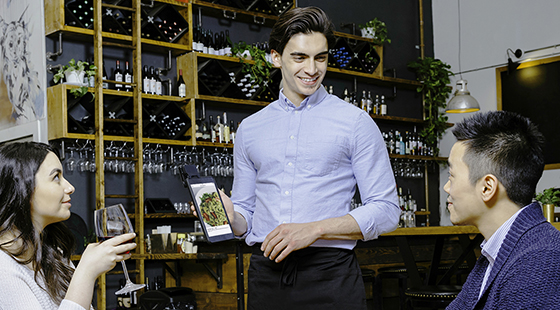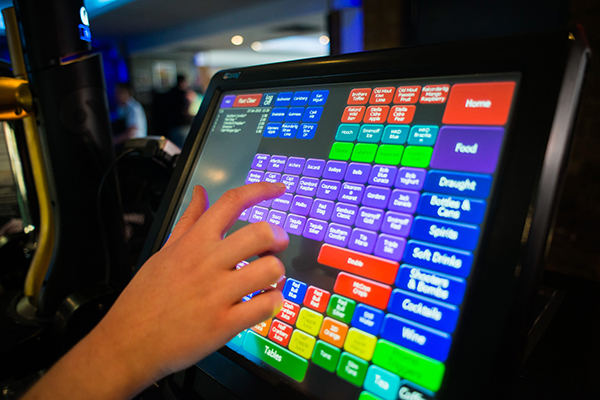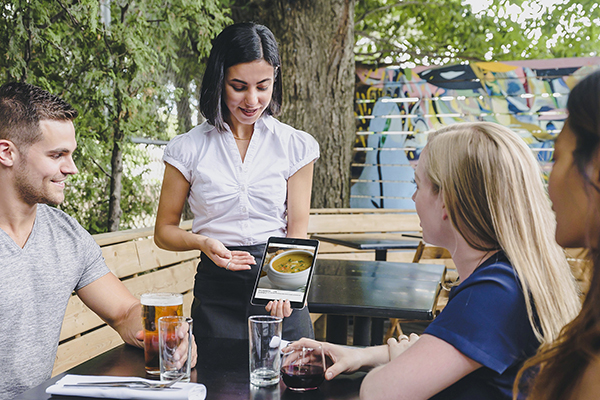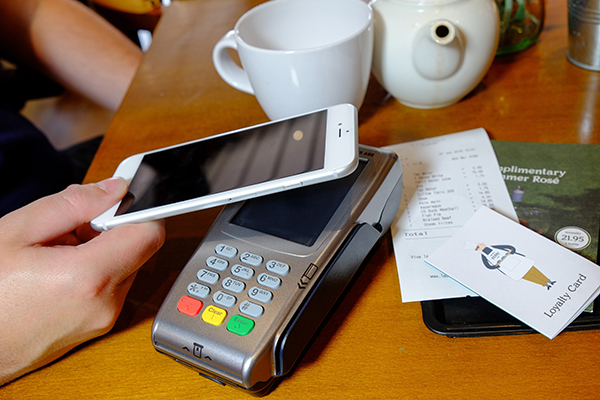Smart hospitality with EPoS
Control and convenience are king for today's consumers, and electronic point of sale providers are responding with self-service counters, handheld devices and integration with mobile apps. Elly Earls reports
You wake up in the morning at the perfect point in your sleep schedule, thanks to your smartphone's sleep monitoring app. Then you grunt at Alexa to play Radio One, before running to the Tube, where you'll tap your smartphone to get through the ticket barrier, listen to music on it during your journey, before whipping it out again 30 minutes later to pay for your morning coffee, collecting your loyalty points at the same time.
A few hours later, you might decide to pre-order your lunch via your favourite café's app so you have time to collect it during your lunch break, remembering as you do that you forgot to make dinner reservations for that night and quickly doing that online too. You're already looking forward to that first sip of your favourite wine, which the waiters always remember to offer you, even if they're new.
And hospitality businesses that want to remain relevant need to ensure that their
systems are - if not already capable of delivering it - flexible enough to integrate with the technologies that can facilitate this sort of customer journey as it becomes a must - rather than an optional extra.
Table service
Traditionally, a till's job was to simply collect cash, but today's most advanced electronic point of sale (EPoS) systems can do much more than that, not only accepting a wide range of payment types - from chip and pin to mobile pay - but also allowing customers to pay in different ways, whether that be online, at the table, at a self-service kiosk or - if they want to go old-school - at the till.
r the last 12 months, mobile PoS devices that waiters can bring to the table have rapidly grown in popularity.
"Since mobile PoS helps service staff provide a better guest experience by being more attentive than they would otherwise, guests come away with a better overall impression and perhaps spend a little more," says James Slatter, managing director for EMEA at hospitality software provider Agilysys. "With mobility, tables can also be turned more quickly, which allows restaurants to seat more guests in a given time period."
Scott Grant, divisional manager at Casio, adds: "Having a mobile ordering solution allows staff to upsell on drinks and food, as well as tailor prompts for specific menu choices, taking the uncertainty out of staff recommendations. And as this is all taking place at the customer's table, there's more opportunity to build rapport with guests."
When combined with data about an individual customer, which can be accessed by staff at the table thanks to integration between the mobile terminal and the central EPoS system, the experience becomes even more memorable.
"This data is used to help identify, for example, that a given customer has a preferred vineyard or varietal each time they purchase red wine and very seldom will they stray from these preferences," says Slatter. "When used consistently, PoS data is a powerful tool to help orchestrate the personalisation of customer experiences."
The self-service solution
With consumers getting more and more used to having control over the transaction process, self-service - whether that be a fixed kiosk, a customer's own device or an in-room tablet in a hotel - is another fast-growing trend.
"Each of these solutions is becoming an essential part of the customer experience and will become the norm within the next three years," predicts Jonathan Lee, solutions business analyst at cloud-hosted hospitality software company Guestline. He adds that one of the big benefits for businesses is reduced operational costs, as staff are not required to be present for all stages of the customer's ordering process.
Ordering and payment systems provider Systopia offers its clients both self-service kiosks and a white label mobile app, which end users can log onto securely and access their personal accounts, check their balance, review their purchases, collect and redeem loyalty points and pre-order their morning
coffee ready for collection upon their arrival.
Benefits for operators include securing repeat business, increasing sales and reducing queue times, according to the company's head of marketing and business development Karen Lillywhite. "The platform can also be used to publicise promotions and let consumers know about new menus and the latest deals through the ability of uploading promotional images," she adds.
Get personal
Zonal Marketing Technologies has seen a huge increase (400%) in the number of enquiries from hospitality brands seeking to develop their own app.
For Zonal's sales and marketing director Clive Consterdine, this is hardly surprising, as according to the company's GO Technology report, carried out quarterly with CGA to track consumer hospitality technology trends, in under two years the number of consumers who use mobile devices to speed up payment has increased from 2.4 million to 3.1 million. -
"Having led the march on providing an integrated white label app solution, Zonal's 'Order and Pay' is proving a very effective tool in terms of driving additional revenue for its customers," he says.
"This is supported by Zonal's GO Technology report, which revealed that 67% of 25- to 34-year-olds would spend more and buy more drinks if they could order from their smartphones rather than queue at the bar or wait for table service."
cial to the success of any mobile app is that, like handheld PoS devices, it integrates with a business's EPoS system.
"Only through integration can the latest promotions, menu choices and availability as well as order processing be managed seamlessly and significantly reduce the risk of mistakes," Consterdine says. -
"Plus, through integrated technology, operators can learn more about their customers, their behaviour and purchasing preferences than ever before, giving them the data to target promotions to meet individual customers' desires, rather than running costly blanket offers." -
Blue-sky thinking
Many EPoS providers' integrations extend to back-of-house systems including purchasing, stock management and accounting, too. The overall result is that operators can get a full view of what's going on in their business at any point - in real time - simplifying crucial business decisions which will improve the experience for customers and streamline operations behind the scenes.
TouchBistro chief executive and founder Alex Barrotti says: "Restaurateurs must use multiple applications to run their business as no single solution does it all. Forward-thinking operators are looking for integration between EPoS, payment and other solutions so they talk to each other. This eliminates time-consuming multiple entries and can provide more comprehensive analytics to help them run their businesses better."
If the system's on the cloud, even better, as Grant explains: "With a cloud-based system, all data can be shared with others and accessed anywhere at any time. Another benefit is that unlike traditional systems, where data can easily be lost due to system crashes or bugs, data is backed up in the cloud, minimising the risk of losing it."
"Traditional systems have massive upfront costs compared to the small subscription costs of cloud-based systems," adds Jerome Laredo, vice-president for EMEA at Lightspeed. "And in terms of updates, traditional systems tend to require manual work. -
"Another benefit of cloud-based systems, other than the obvious advantage of mobility, is customisability. You can really tailor systems like Lightspeed to the needs of your business." -
Rise of the chatbots
Simon Moran, chief commercial officer at mobile payment and loyalty platform Yoyo, believes self-service terminals and cashless and contactless payments will continue their inexorable rise. And with the introduction of Open Banking this year, enhanced payment experiences are set to gain significant ground.
"We are already working with Starling Bank and Visa to deliver instant payment combined with automated retailer-specific loyalty collection and voucher redemption to customers, regardless of the contactless payment method," he explains.
"With this technology, in future the consumer will simply use their contactless card to pay and Yoyo will automatically award loyalty points and stamps in the cloud."
"This technology will have an impact on the industry, with AI taking bookings and orders virtually, helping to create seamless 24/7 customer service," predicts Consterdine. The question is not how but when AI will move from the 'in home' to 'out of home' leisure experience. That is down to the industry and how quickly it is prepared to adopt AI technology."
Ask the right questions -
In the meantime, there are a number of questions operators need to ask if they're thinking about upgrading.
Are you making transactions fast enough? How often do you receive features updates? Do you have state-of the-art hardware? Which integrations do you feel the business needs and can the new system accommodate this? Is your system cloud-based and accessible no matter where you are? What are the reporting capabilities?
"The more customisable and granular, the easier it is to create a memorable experience," Laredo says, adding that staff, too, need to be taken into account.
"The system should be easy-to-use, secure and customisable. This will ensure your staff are fully trained with ease, maintain good communication across teams and, more importantly, spend the majority of their time engaging with customers.
"Finally, think big. Find a system that grows with the business and can match the demands of multiple sites at the same time."
Zonal speeds up service
donald Hotels & Resorts is the UK's largest privately owned hotel group, operating 53 hotels throughout the UK, Ireland, Portugal and Spain, employing more than 4,000 staff and servicing more than 4,500 hotel rooms.
When the group realised the EPoS solution it had been using for the past 10 years was inflexible, they decided to upgrade to Zonal's Aztec EPoS, installing it in 35 hotel bars and restaurants, along with mobile ordering through iPads via the
iServe handheld solution. -
IT director Stuart Garrick says: "Whether it's our chef's creativity to develop seasonal specials, to changing prices locally or across the estate, we can now do it in minutes."
Meanwhile, the iServe system means orders can be quickly taken at the table, directly feeding into the EPoS system, which in turn sends the order directly to the kitchen. "Zonal technology has gone a long way to helping our staff to take more orders, while reducing mistakes and speeding up service," Garrick says.
He has also been impressed with the level of business intelligence he and his colleagues have access to through Aztec's Dimensions reporting module, which aggregates with external platforms such as PMS, payroll, budgets and spreadsheets to create bespoke, real-time data analysis.
They can now compare various sources of data and gather insight about everything from top sellers to wastage percentages and the bed-to-dining ratio.
Building loyalty with Yoyo
Thanks to open APIs, information can be shared between EPoS systems and any number of third-party apps, such as Yoyo Wallet, a mobile platform that allows customers to pay and collect loyalty rewards via their smartphone.
As Moran explains: "Being rewarded for retailer loyalty in a personalised way is now key to a great shopping experience on the high street - and this principle is absolutely core to what Yoyo provides for retailers and their customers.
"Yoyo is unique because users who sign up to the Yoyo app are given combined access to instant payment and all the benefits of retailer-specific loyalty programmes - irrespective of the EPoS they encounter."
The Yoyo in-app marketplace also enables operators to target and entice a much wider customer base than they might ordinarily, even if those customers have not shopped with them previously.
For example, during November and December, Caffè Nero ran a Christmas campaign through its Yoyo-powered app, which resulted in total app registrations increasing by 30%. -
Whenever a customer bought an item through the app, they received a digital Christmas cracker and the chance to win a prize including a trip to Rome or a gift card. All they had to do was 'pull' or 'shake' their cracker to find out if they'd won. Average spend per user also increased by 13%.
Continue reading
You need to be a premium member to view this. Subscribe from just 99p per week.
Already subscribed? Log In














